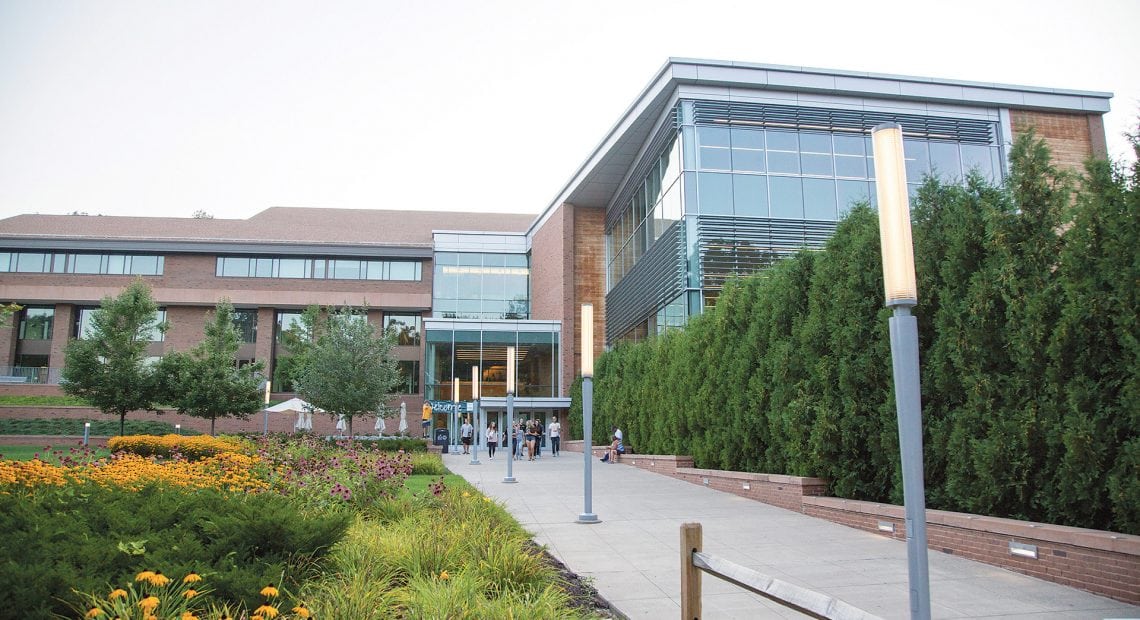A Potential Game Changer
John Cook says that, while the cost of a community-college education (roughly $7,000 per year) isn’t high, at least when compared with that of a four-year institution, public or private, it can be, and often is, a barrier that some cannot overcome, even with financial aid.
And for others, it’s enough of an obstacle for them to think twice about college — or not at all.
“Like anything in our lives, we can’t just separate this cost or isolate it from all the other considerations for a human being; it’s one more thing, one more cost in the lives of so many … this is why we see students drop out, or say ‘now is not the time,’” said Cook, president of Springfield Technical Community College (STCC). “Any way to get a whole lot of people, frankly, to take this second look is a good thing.”
With that, Cook added his voice to many others who are praising Gov. Maura Healey’s inclusion in the budget of something she calls MassReconnect, which would fund free community-college certificates and degrees to the Commonwealth’s residents who are age 25 and older and have not yet earned a college degree.
“This is a group of adults, many of whom have college credits, that we really want to encourage to come and take another look at college.”
John Cook
According to some statistics released by the state, roughly 2 million residents would be eligible for the program — individuals who have a high-school diploma but not a college degree — and perhaps 700,000 of these individuals already have some college credits.
MassReconnect, which is actually one of two ‘free’ community-college programs that have been proposed (Senate President Karen Spilka has proposed free community college for all students), would provide both incentive and the means for many people to return to college and get the degree or certificate that might open a door to not just a job, but a career, said Christina Royal, president of Holyoke Community College (HCC).
“This is a potential game changer,” she told BusinessWest, adding that MassReconnect targets what she called the “emerging space of adult learners,” individuals who want a college education, but are held back by competing demands on their life, including family and work.
“The governor’s MassReconnect proposal is a great starting point that increases access for adult learners who don’t already have a college credential,” she went on. “It’s designed to help them finish that stretch so they can get a college credential.”
Michelle Schutt, president of Greenfield Community College, concurred. She said GCC ran some numbers and determined that nearly 200 of the roughly 1,400 students currently enrolled would qualify for the program. “That’s not insignificant,” she said, adding that many more in the community who are not enrolled who might be inspired to connect, or ‘reconnect,’ as the case may be.
“I’m incredibly excited about this,” she added. “Reconnecting with those people who have some college but no degree and letting them know that there’s a new opportunity here has great potential for the community colleges and GCC specifically.”
Rick Sullivan, president and CEO of the Western Massachusetts Economic Development Council, agreed.
Using similar language, he said MassReconnect could have broad and powerful impact over time, providing benefits for the region, its employers, and both community colleges and the four-year institutions for which they are feeders.
“Reconnecting with those people who have some college but no degree and letting them know that there’s a new opportunity here has great potential for the community colleges and GCC specifically.”
Michelle Schutt
Based on initiatives in Michigan and Tennessee, the MassReconnect proposal actually goes further than those programs by covering more than just tuition; it also covers mandatory fees, books, and various support services. It is designed to remove barriers to getting the college degree that is needed to succeed in most jobs today, and it holds significant promise to just that, said those we spoke with.
Cook told BusinessWest that the average age of a student at STCC is 26, a statistic that might surprise some, but certainly helps explain the thinking behind MassReconnect and its potential impact.
“This idea is right in our wheelhouse,” he noted. “This is a group of adults, many of whom have college credits, that we really want to encourage to come and take another look at college.”
Indeed, he went on, for many individuals over age 25, there are now many competing forces when it comes to the weekly budget, and for a good number of them, higher education is something that doesn’t make the cut. MassReconnect, as he noted earlier, provides people an opportunity to rethink college education.
“There are many students who might just have the perception that they are priced out,” he said. “And when we give them a chance to look at this, they might realize, ‘OK, that business degree is not out or my reach,’ or ‘maybe a manufacturing program isn’t going to be too big a lift for me.’”
Ripple Effects
Royal concurred, and noted that MassReconnect will bring more attention to the state’s community colleges — and the careers that individuals can access with two years (or less) of college education.
“Massachusetts, as a state, needs to move beyond the notion that everything requires a bachelor’s degree,” she told BusinessWest. “There are many jobs where an associate degree would either elevate their wages or help them gain a footing toward a career change or a particular job.”
Cook agreed, and said he considers MassReconnect to be an investment in the state’s community colleges and a huge opportunity to introduce more individuals to the value of the education provided by these schools and their ability to help open doors.
“At this price point, and with our class sizes, you won’t find a better deal,” he told BusinessWest.
“Massachusetts, as a state, needs to move beyond the notion that everything requires a bachelor’s degree.”
Christina Royal
Schutt noted that these arguments and others have been born out in other states where the notion of free community college has become reality, especially Michigan, which adopted a model on which MassReconnect is based and has had it in place for three years now. She said that state has measured its success in many ways.
“From the number of people who came to the college to the number earning better wages, and more, this model has proven successful,” she said. “Those schools recognize that these are students they wouldn’t have otherwise.”
As he assesses MassReconnect and the broad concept of free community college, Sullivan said there will be a broad trickle-down resulting from making these schools more accessible.
For starters, the community colleges themselves will benefit, he said, noting they have been hit hard by sharp declines in enrollment over the past decade, a trend only exacerbated by the pandemic.
Cook qualified this decline by pointing out that STCC’s enrollment — just over 3,600 — is down a full 50% from the school’s peak in 2012 of roughly 7,000, numbers that reflect everything from smaller high-school graduating classes to a still-robust economy featuring low unemployment — the conditions that don’t spur enrollment at community colleges.
But enrollent has become a challenge at most all public and private institutions, Sullivan noted, adding that, over time, this concept of free community college could provide a boost for the large and important ‘Eds’ component of the region’s economy.
“Western Mass. is really lucky … obviously, we have four community colleges [STCC, HCC, Greenfield Community College, and Berkshire Community College] that are well-respected and do a great job,” he said. “But they are also feeders into our four-year colleges and universities, and we’re fortunate that we’ve got such a high-end cohort of four-year and community colleges in this region, and it is an important part of our economy.
“Most all of these schools are looking to bring in more students to be able to grow,” he went on. “So it shouldn’t be lost on people that, in many cases, the community colleges are the start of the training and retraining of that workforce.”
Elaborating, he said that while the higher-ed sector will benefit from free community college, the broader impact will be on the region’s employers, which have been struggling with workforce issues, to one degree or another, for the past several years.
“Workforce is the issue that every single employer is facing right now, and it’s probably the biggest barrier to growth; it doesn’t matter what sector you’re in,” Sullivan said. “This opportunity to bring it back — or, to use the governor’s phrase, ‘reconnect’ — is a good one for our region.”
Cook agreed, and noted that while sectors — and college programs — may not be greatly impacted by MassReconnect (many healthcare programs, such as nursing, already boast strong enrollment), there are others that will, because the assistance from the state might act to remove a barrier to exploring certain fields.
He mentioned manufacturing as one of them, noting that, while this sector features well-paying jobs and attractive opportunities, it still manages to elude the attention of many job seekers.
“I would love for us to continue to demystify manufacturing, to see people realize it’s very much a high-tech, high-end, laboratory type of setting for so many of the professionals working in this field,” he said, adding that MassReconnect, if it becomes reality (and it has the support of many in the State House), could help achieve that.
Bottom Line
Overall, and combining MassReconnect with the elimination of COVID vaccine requirements and proposed fee-stabilization initiatives, Cook can envision a lift in enrollment for this fall’s semester — perhaps a 2%, 3%, or 4% gain, this on top of a 4% improvement registered this spring.
Just how big a lift remains to be seen, obviously, but any improvement would be a step in the right direction, he said, and hopefully the first of many such steps.










